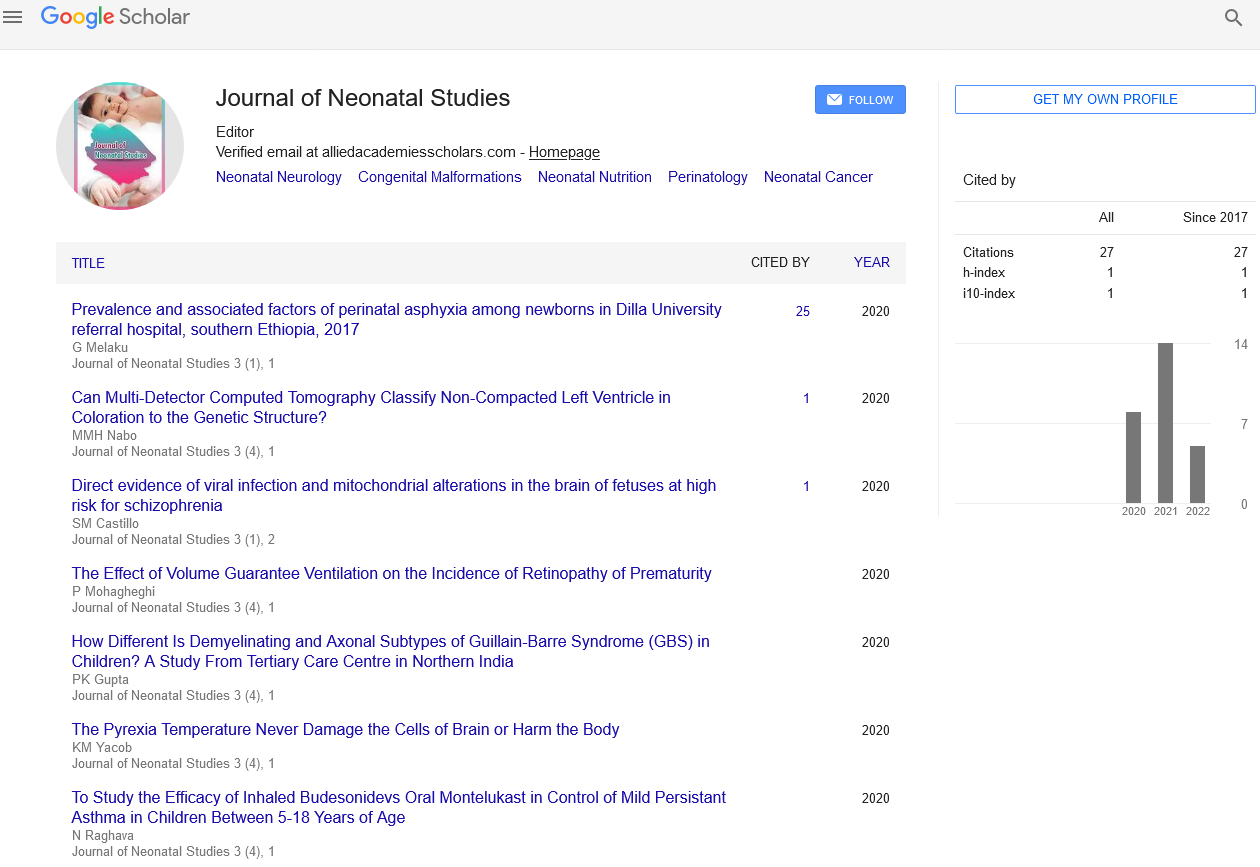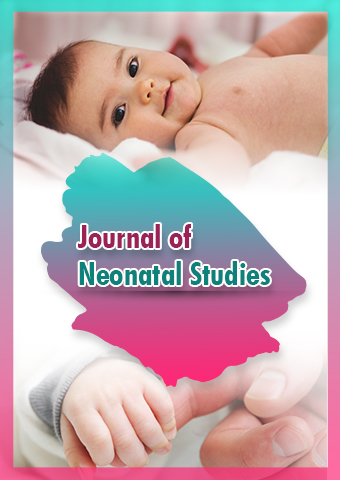Perspective - Journal of Neonatal Studies (2024) Volume 7, Issue 3
Metabolic Challenges in Preterm Birth Babies: Understanding and Addressing the Complexities
- Corresponding Author:
- Mufaro Fuente
Department of Paediatrics, University of South Carolina, United States
E-mail: mufaro_fuente@mailbox.sc.edu
Received: 13-May-2024, Manuscript No. JNS-24-137923; Editor assigned: 15-May-2024, PreQC No. JNS-24-137923 (PQ); Reviewed: 29-May-2024, QC No. JNS-24-137923; Revised: 18-Jun-2024, Manuscript No. JNS-24-137923 (R); Published: 25-Jun-2024, DOI: 10.37532/JNS.2024.7(3).219-220
Introduction
Preterm birth, defined as birth before 37 weeks of gestation, presents a myriad of challenges for newborns, including metabolic issues that can have long-lasting effects on their health and development. Metabolism, the complex process by which the body converts food into energy and builds and repairs tissues, is particularly vulnerable in preterm infants due to their underdeveloped organ systems and immature physiological functions. In this article, we explore the metabolic problems faced by preterm birth babies, the underlying factors contributing to these challenges, and strategies for prevention and management.
Description
Metabolic challenges in preterm birth babies
Hypoglycemia: One of the most common metabolic problems encountered in preterm infants is hypoglycemia, or low blood sugar levels. Preterm babies have limited glycogen stores and reduced capacity for gluconeogenesis, the process by which the body synthesizes glucose from non-carbohydrate sources, making them susceptible to fluctuations in blood glucose levels.
Consequences of hypoglycemia include neurological impairment, seizures, and poor feeding tolerance. Close monitoring of blood glucose levels and timely intervention with intravenous or oral glucose supplementation are essential to prevent complications.
Hyperbilirubinemia: Hyperbilirubinemia, characterized by elevated levels of bilirubin in the blood, is another metabolic issue commonly observed in preterm infants. Immature liver function, increased red blood cell turnover, and decreased intestinal motility contribute to the accumulation of bilirubin, leading to jaundice.
Severe hyperbilirubinemia can result in kernicterus, a rare but serious neurological condition characterized by irreversible brain damage. Phototherapy and, in severe cases, exchange transfusions are used to manage hyperbilirubinemia and prevent neurological sequelae.
Poor growth and nutritional deficiencies: Preterm infants often struggle with poor growth and nutritional deficiencies due to their limited capacity for nutrient absorption and utilization. Immature digestive enzymes, impaired gut motility, and increased energy expenditure contribute to feeding intolerance and failure to thrive.
Nutritional support, including human milk fortification, specialized preterm formulas, and parenteral nutrition, is essential to meet the increased nutrient requirements of preterm infants and support optimal growth and development.
Metabolic bone disease: Metabolic bone disease, characterized by decreased bone mineralization and skeletal abnormalities, is a significant concern in preterm infants, particularly those born at very low birth weights. Immature renal function, vitamin D deficiency, and alterations in calcium and phosphorus metabolism contribute to impaired bone health.
Strategies to prevent metabolic bone disease include vitamin D supplementation, calcium and phosphorus fortification of enteral feeds, and early mobilization and weight-bearing activities to promote skeletal development.
Underlying factors contributing to metabolic challenges
Several factors contribute to the metabolic challenges faced by preterm birth babies:
Immature organ systems: Preterm infants have underdeveloped organ systems, including the liver, kidneys, gastrointestinal tract, and endocrine glands, which compromise their ability to regulate metabolic processes effectively.
Inadequate nutrient stores: Preterm babies are born with limited nutrient stores, particularly glycogen and fat, which are essential for energy metabolism and thermoregulation. Intrauterine growth restriction further exacerbates nutrient deficiencies and metabolic vulnerabilities.
Disrupted maternal-fetal nutrition: Intrauterine exposure to maternal conditions such as gestational diabetes, hypertension, and malnutrition can alter fetal metabolism and increase the risk of metabolic disturbances in preterm infants.
Medical interventions: Intensive medical interventions, including mechanical ventilation, medications, and surgery, can disrupt normal metabolic processes and exacerbate metabolic challenges in preterm infants.
Strategies for prevention and management
Addressing metabolic challenges in preterm birth babies requires a multidisciplinary approach involving neonatologists, pediatricians, dietitians, and nurses. Key strategies include:
Early initiation of enteral feeding: Initiating enteral feeding as soon as clinically feasible promotes gastrointestinal maturation, enhances nutrient absorption, and reduces the risk of feeding intolerance and metabolic complications.
Individualized nutritional support: Tailoring nutritional support to the unique needs of each preterm infant, including appropriate macronutrient composition, micronutrient supplementation, and fortification of breast milk or formula, is essential for optimizing growth and development.
Close monitoring and surveillance: Regular monitoring of metabolic parameters, including blood glucose, bilirubin, electrolytes, and bone mineral density, allows for early detection of metabolic abnormalities and timely intervention to prevent complications.
Supportive care and developmental support: Providing supportive care, including skin-toskin contact, kangaroo care, and developmental care practices, promotes physiological stability, reduces stress, and supports neurodevelopmental outcomes in preterm infants.
Conclusion
Metabolic challenges are a significant concern in preterm birth babies, requiring vigilant monitoring, timely intervention, and targeted nutritional support to optimize growth and development. By understanding the underlying factors contributing to metabolic disturbances and implementing evidence-based strategies for prevention and management, healthcare providers can improve outcomes for preterm infants and reduce the burden of metabolic complications in this vulnerable population.

